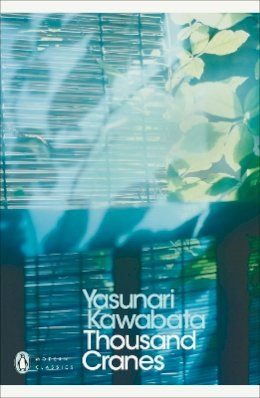23%OFF

Stock image for illustration purposes only - book cover, edition or condition may vary.
Thousand Cranes
Yasunari Kawabata
€ 13.99
€ 10.81
FREE Delivery in Ireland
Description for Thousand Cranes
Paperback. Kikuji has been invited to a tea ceremony by a mistress of his dead father. He is shocked to find there the mistress's rival and successor, Mrs Ota, and that the ceremony has been awkwardly arranged for him to meet his potential future bride. But he is most shocked to be drawn into a relationship with Mrs Ota. Translator(s): Seidensticker, Edward G. Series: Penguin Modern Classics. Num Pages: 112 pages. BIC Classification: FA; FYT. Category: (G) General (US: Trade). Dimension: 200 x 151 x 7. Weight in Grams: 92.
Kikuji has been invited to a tea ceremony by a mistress of his dead father. He is shocked to find there the mistress's rival and successor, Mrs. Ota, and that the ceremony has been awkwardly arranged for him to meet his potential future bride. But he is most shocked to be drawn into a relationship with Mrs. Ota - a relationship that will bring only suffering and destruction to all of them. Thousand Cranes reflects the tea ceremony's poetic precision with understated, lyrical style and beautiful prose.
Kikuji has been invited to a tea ceremony by a mistress of his dead father. He is shocked to find there the mistress's rival and successor, Mrs. Ota, and that the ceremony has been awkwardly arranged for him to meet his potential future bride. But he is most shocked to be drawn into a relationship with Mrs. Ota - a relationship that will bring only suffering and destruction to all of them. Thousand Cranes reflects the tea ceremony's poetic precision with understated, lyrical style and beautiful prose.
Product Details
Publisher
Penguin Books Ltd United Kingdom
Number of pages
112
Format
Paperback
Publication date
2011
Series
Penguin Modern Classics
Condition
New
Number of Pages
112
Place of Publication
London, United Kingdom
ISBN
9780141192604
SKU
V9780141192604
Shipping Time
Usually ships in 5 to 9 working days
Ref
99-99
About Yasunari Kawabata
Yasunari Kawabata was born near Osaka in 1899 and was orphaned at the age of two. His first stories were published while he was still in high school and he decided to become a writer. He graduated from Tokyo Imperial University in 1924 and a year later made his first impact on Japanese letters with Izu Dancer. He soon became a leading figure the lyrical school that offered the chief challenge to the proletarian literature of the late 1920s. His writings combine the two forms of the novel and the haiku poems, which within restrictions of a rigid metre achieves a startling beauty by its juxtaposition of opposite and incongruous terms. Snow Country (1956) and Thousand Cranes (1959) brought him international recognition. Kawabata died by his own hand, on April 16 1972. Thousand Cranes is translated from the Japanese by Edward G. Seidensticker (1921-2007), who was a prominent scholar of Japanese literature.
Reviews for Thousand Cranes
A literary habitat like no other . . . quietly devastating fiction. . . . Behind a lyrical and understated surface, chaotic passions pulse
The Independent (London)
Thousand Cranes has the qualities of the best Japanese writing: a stunning economy, delicacy of feeling, and a painter's sensitivity to the visible world
The Atlantic
A novel of exquisite artistry . . . rich suggestibility . . . and a story that is human, vivid and moving
New York Herald Tribune
Kawabata is a poet of the gentlest shades, of the evanescent, the imperceptible. This is a tragedy in soft focus, but its passions are fierce
Commonweal
The Independent (London)
Thousand Cranes has the qualities of the best Japanese writing: a stunning economy, delicacy of feeling, and a painter's sensitivity to the visible world
The Atlantic
A novel of exquisite artistry . . . rich suggestibility . . . and a story that is human, vivid and moving
New York Herald Tribune
Kawabata is a poet of the gentlest shades, of the evanescent, the imperceptible. This is a tragedy in soft focus, but its passions are fierce
Commonweal
